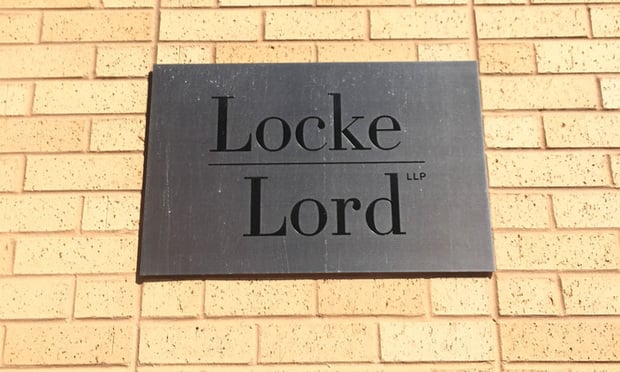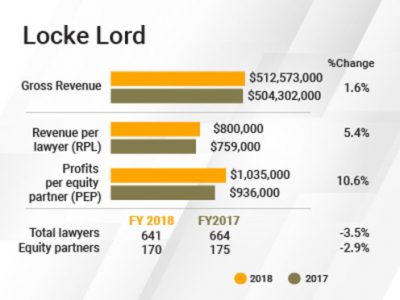Locke Lord Grows Revenue, Profits in Turnaround Year
Revenue per lawyer hit $800,000 in 2018, and profits per equity partner topped the seven-figure mark.
February 11, 2019 at 05:35 PM
4 minute read
The original version of this story was published on Texas Lawyer
 Locke Lord offices in Washington, D.C. Photo by Diego M. Radzinschi/ALM
Locke Lord offices in Washington, D.C. Photo by Diego M. Radzinschi/ALM
Locke Lord saw revenue tick up slightly and profits per equity partner (PEP) jump in 2018, based on preliminary financial results that show an improved trajectory from 2017 for the Dallas-based firm.
Gross revenue came in at $512.57 million in 2018, up 1.6 percent from 2017, when it was $504.3 million. Net income was $175.45 million in 2018, up 7 percent from $163.99 million the previous year.
Revenue per lawyer hit $800,000 in 2018, up 5.4 percent from 2017, while PEP surpassed the $1 million mark, coming in at $1.035 million. That showed a healthy 10.6 percent increase from $936,000 the year before.
“It was a strong year for us, and we are pleased with the performance across the firm in many different areas—strong in litigation, corporate and IP spaces,” said David Taylor, a partner in Houston who just wrapped up his first year as chairman of the firm.
Those positive results show change from a year ago, when the firm's gross revenue slipped by 9.8 percent and net income declined by 6.2 percent.
Taylor said many practice areas were “just a little bit better” in 2018 than in 2017.
“We did have some increase in IP litigation and some good results in commercial litigation, continued strength in the insurance and reinsurance [space], corporate space and the energy infrastructure deal space,” he said, noting that other areas, including financial litigation, private equity and energy M&A, were also busy during 2018.
He said the firm did reap the benefits of a contingency fee from a commercial litigation suit, but it was not a major factor in results.
Locke Lord, which has 20 offices, saw head count decline in 2018. The firm had a 641 lawyers counted on a full-time equivalent basis in 2018, compared with 664 lawyers the year before. And it lost a net of five equity partners, with 170 for 2018, compared with 175 the year before. The declines in lawyer count are not as dramatic as in 2017, however, when the firm lost more than 10 percent of its lawyers.
But the nonequity partner tier shrank by 23.4 percent in 2018, with 124 nonequity partners, down from 162 the previous year.
Taylor said lateral moves explain some of the decline, but it is also related to some partners scaling back their practices and changing their titles. Without a mandatory retirement policy at the firm, Taylor said, many lawyers choose to stay but reduce their workload.
One of the firm's 2018 initiatives was naming Paulette Brown, the former American Bar Association president, as the firm's first-ever chief diversity and inclusion officer. She will focus on recruiting, retaining and creating benchmarks for women, minority and LGBTQ lawyers at the firm.
“Both from a strategic standpoint, and a let's-get-it-done standpoint, that was a real focus of ours this year,” Taylor said.
Looking forward to 2019, Taylor said the firm has revised its strategic plan, and identified certain sectors for growth, including energy, finance and financial services, insurance and reinsurance, pharmaceuticals and private equity.
“We believe we've got strong client bases in those areas, not at the exclusion of other wonderful practice areas. Building on your strengths is something we need to be doing,” Taylor said.
Further Reading:
Jerry Clements to Step Down as Chair of Locke Lord; Houston Partner David Taylor to Succeed Her
Locke Lord Posts Declines in Net Income, Gross Revenue in 2017
Lawyer Returns to Locke Lord After Leaving Top Job at HUD in DC
Big Texas Firms Expand in London — and It's Not All About Energy
Locke Lord Hires Troutman Sanders International Arbitration Duo in Hong Kong
This content has been archived. It is available through our partners, LexisNexis® and Bloomberg Law.
To view this content, please continue to their sites.
Not a Lexis Subscriber?
Subscribe Now
Not a Bloomberg Law Subscriber?
Subscribe Now
NOT FOR REPRINT
© 2025 ALM Global, LLC, All Rights Reserved. Request academic re-use from www.copyright.com. All other uses, submit a request to [email protected]. For more information visit Asset & Logo Licensing.
You Might Like
View All

Three Akin Sports Lawyers Jump to Employment Firm Littler Mendelson

Brownstein Adds Former Interior Secretary, Offering 'Strategic Counsel' During New Trump Term
2 minute read
Trending Stories
- 1Departing Attorneys Sue Their Former Law Firm
- 2Pa. High Court: Concrete Proof Not Needed to Weigh Grounds for Preliminary Injunction Order
- 3'Something Else Is Coming': DOGE Established, but With Limited Scope
- 4Polsinelli Picks Up Corporate Health Care Partner From Greenberg Traurig in LA
- 5Kirkland Lands in Phila., but Rate Pressure May Limit the High-Flying Firm's Growth Prospects
Who Got The Work
J. Brugh Lower of Gibbons has entered an appearance for industrial equipment supplier Devco Corporation in a pending trademark infringement lawsuit. The suit, accusing the defendant of selling knock-off Graco products, was filed Dec. 18 in New Jersey District Court by Rivkin Radler on behalf of Graco Inc. and Graco Minnesota. The case, assigned to U.S. District Judge Zahid N. Quraishi, is 3:24-cv-11294, Graco Inc. et al v. Devco Corporation.
Who Got The Work
Rebecca Maller-Stein and Kent A. Yalowitz of Arnold & Porter Kaye Scholer have entered their appearances for Hanaco Venture Capital and its executives, Lior Prosor and David Frankel, in a pending securities lawsuit. The action, filed on Dec. 24 in New York Southern District Court by Zell, Aron & Co. on behalf of Goldeneye Advisors, accuses the defendants of negligently and fraudulently managing the plaintiff's $1 million investment. The case, assigned to U.S. District Judge Vernon S. Broderick, is 1:24-cv-09918, Goldeneye Advisors, LLC v. Hanaco Venture Capital, Ltd. et al.
Who Got The Work
Attorneys from A&O Shearman has stepped in as defense counsel for Toronto-Dominion Bank and other defendants in a pending securities class action. The suit, filed Dec. 11 in New York Southern District Court by Bleichmar Fonti & Auld, accuses the defendants of concealing the bank's 'pervasive' deficiencies in regards to its compliance with the Bank Secrecy Act and the quality of its anti-money laundering controls. The case, assigned to U.S. District Judge Arun Subramanian, is 1:24-cv-09445, Gonzalez v. The Toronto-Dominion Bank et al.
Who Got The Work
Crown Castle International, a Pennsylvania company providing shared communications infrastructure, has turned to Luke D. Wolf of Gordon Rees Scully Mansukhani to fend off a pending breach-of-contract lawsuit. The court action, filed Nov. 25 in Michigan Eastern District Court by Hooper Hathaway PC on behalf of The Town Residences LLC, accuses Crown Castle of failing to transfer approximately $30,000 in utility payments from T-Mobile in breach of a roof-top lease and assignment agreement. The case, assigned to U.S. District Judge Susan K. Declercq, is 2:24-cv-13131, The Town Residences LLC v. T-Mobile US, Inc. et al.
Who Got The Work
Wilfred P. Coronato and Daniel M. Schwartz of McCarter & English have stepped in as defense counsel to Electrolux Home Products Inc. in a pending product liability lawsuit. The court action, filed Nov. 26 in New York Eastern District Court by Poulos Lopiccolo PC and Nagel Rice LLP on behalf of David Stern, alleges that the defendant's refrigerators’ drawers and shelving repeatedly break and fall apart within months after purchase. The case, assigned to U.S. District Judge Joan M. Azrack, is 2:24-cv-08204, Stern v. Electrolux Home Products, Inc.
Featured Firms
Law Offices of Gary Martin Hays & Associates, P.C.
(470) 294-1674
Law Offices of Mark E. Salomone
(857) 444-6468
Smith & Hassler
(713) 739-1250









